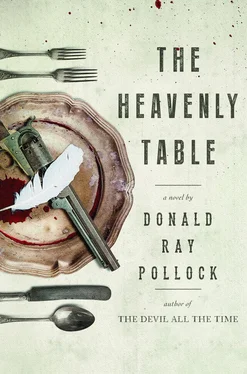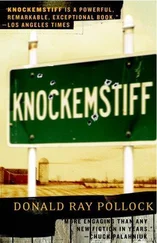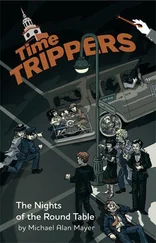Stretching out his legs, Bovard pulled a small leather case from his pocket and took out a cigar. His father had sent him a box of them last week, along with a carved walking stick and the last known copy of Colonel Pritchard’s memoir, a musty tome called A Great Man Looks Back, which he’d found completely unreadable and had passed on to the camp library. He cut off the end of the golden brown Cuban with a small pair of snips and reached for a match. He still found it hard to believe that just three months ago he was sitting in a hotel room in Columbus, Ohio, drunk and filled with self-loathing, mulling over the best way to kill himself. As he puffed, he thought again about the initial cause of his despair, his former fiancée, Elizabeth Shadwell. Just as he was finishing his degree at Kenyon College, and turning his thoughts to their upcoming wedding, she had suddenly jilted him, explaining in her Dear John letter that she had fallen in love with somebody else, an attorney already moving up in a well-respected firm in New York that worked chiefly on behalf of several major industrialists with war contracts amounting to millions. Looking back on it now, Bovard knew that he shouldn’t have been so surprised at her desertion. Ever since he had left Harvard at the end of his second year to go study at Kenyon with Professor Hubert Lattimore, a world-renowned expert on ancient Greek and Roman board games, Elizabeth had hinted that she was having doubts about his choice of study, even referring to it on several occasions as nothing more than “a frivolous pastime.” To think that he had worked himself half to death to become one of the only five people on the planet who understood the convoluted and seemingly nonsensical rules of divide et impera, only to have her call it a hobby! “Again, I am sorry,” she had added in a postscript to that last missive, “but I have to think of the future. I wish you the very best of luck with whatever you finally decide to do with your life.” He had sensed her oil tycoon father’s influence behind the entire thing, it being no secret that Bernard Shadwell was revolted by his potential son-in-law’s apparent lack of interest in moneymaking. And so, in just a few lines of delicate script, Elizabeth had violently altered the course of his life, a life that seemed, in the immediate aftermath of her betrayal, to have been wasted on ancient ideals and traditions that couldn’t even begin to compete with the ego-driven, cannibalistic forces of twentieth-century capitalism.
Though he had put on a brave front when his parents arrived from Philadelphia for his graduation ceremony, as soon as he saw them back onto the train, he’d packed a bag and fled to a hotel in nearby Columbus. After ordering a case of brandy brought up to his room, he had stripped down to his underwear and proceeded to get completely soused, his plan being to slit his veins open in the bathtub upon finishing the last bottle, just as the noblest of Romans had done. However, near the end of his third day, something began to bother him. Perhaps it was some vague sense of manly completeness he was after, or, more likely, just plain old revenge, but he suddenly felt the need to lose his virginity before committing himself to the Great Beyond. With a faithfulness that now seemed downright comical, he had kept himself pure for his wedding night, but now there would be no such night. How many times, he drunkenly wondered, as he cracked open another bottle, had that little slut been untrue while he walked around the Kenyon campus at two in the morning with a throbbing pair of blue balls?
But how to go about it? He knew nobody in Columbus except a distant aunt, and the only thing he remembered about that overly pious woman was that she owned a vast collection of hair shirts and was allergic to sunlight. Too, he wanted to get the matter over with as quickly as possible, and hated the thought of wasting time on wining and dining and drawn-out seductions. Of course, there had to be prostitutes about; according to some of his school chums, such women were everywhere, even in the dreariest sectors of the Corn Belt. Drawing the window blinds, he lay down on the bed and entertained images of a sophisticated, dark-eyed Italian courtesan tapping shyly on his door. Their one night of passion would be so intense that later, unable to bear the thought of living without him, she would weigh herself down with stones and throw herself off a bridge into one of the muddy, carp-infested rivers that flowed through the Buckeye State in the same ponderous way sap seeps from a tapped maple. Then things got fuzzy, and after a time, he passed out again.
In the end, after being holed up in the hotel room for over a week, he offered a slatternly, red-haired Irish chambermaid fifty dollars to sleep with him. Although she readily agreed to the exchange — after all, it was probably more money than she earned in a month — to his surprise, the little hussy had the audacity to insist on certain conditions. Studying him with eyes that resembled cold, green marbles, she said, “First off, ain’t nothin’ happens till the ol’ mouse is warmed up good and proper.”
“Excuse me?” Bovard said, a puzzled look on his unshaven face. “The mouse?”
“Me privates,” she said, rolling her eyes at his ignorance. “I love a man’s tongue on my puss, but my old man, he’s too old-fashioned for it. Says it always make him feel like a hog eatin’ from a trough.”
“Good God!”
“And I’d need a nice lunch before we get down to the bizness.”
Completely rattled, Bovard reached for a bottle on the nightstand and took a long drink.
“And cake and ice cream for dessert,” she went on. “I crave the sweets even more than a good screw.”
“I can’t believe what I’m hearing,” Bovard said in a faint voice, more to himself than to the maid.
“And another thing, too,” she said, waving a finger in the air. “The fifty don’t count for anything extra.”
“Extra?”
“Yeah,” she said. “If’n, say, you force me to swaller your wad, or you get the notion to poke me in the bunghole. Each of them filthy acts is another fiver.”
The maid said all of this without the slightest embarrassment, and the full extent of Bovard’s reversal of fortune struck him just then like a knife in the pit of his queasy stomach. To think that a fortnight ago he was engaged to one of the most beautiful and sought-after young women in Philadelphia, and now here he was, about to surrender his virtue to a gutter-minded domestic with a bubbly rash on her neck and a smear of what appeared to be egg yolk on her pointy, somewhat bristly chin. But he was growing afraid that he would lose the nerve to kill himself if he kept putting it off. She would have to do. He picked up the phone and ordered the lunch.
When the desk clerk, a beer-bellied, liver-spotted sad sack, knocked at the door, the maid rushed to the closet and hid. Just pushing the cart into the room, loaded with enough food to feed a family of six, seemed to leave the poor bastard exhausted, and an uncomfortable minute or two went by while he leaned one hand against the wall and panted. Finally, after recovering from his labors and making sure everything was to Bovard’s satisfaction, he started out, but then turned and asked in a wheezy, apologetic voice, “Beg your pardon, sir, but you haven’t seen Myrtle around, have you?”
“Myrtle?”
“Yes, sir, the maid who takes care of this floor.”
“No,” Bovard said hurriedly, “I haven’t seen anyone.”
“I was just wondering, sir. She’s left her things right outside your door.”
“Her things?”
“Yes, sir, her mop and linens and such.” The man glanced at the closet, then started to step out into the hall. “That’s all right, sir,” he mumbled, as he closed the door. “She was having tummy troubles this morning, so she’s probably gone off to the terlet.”
Читать дальше












